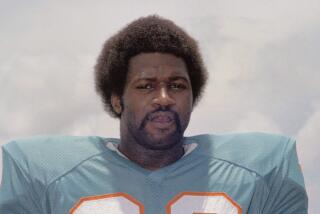Debate Begins on Where He Ranks Among Elite
If it’s all about winning championships, Ram quarterback Kurt Warner is a first-ballot choice for the Pro Football Hall of Fame, and Miami’s Dan Marino doesn’t get in without paying the price of admission.
Marino played for Don Shula and Jimmy Johnson, Super Bowl-winning coaches, but never won a Super Bowl under either of them and made only one appearance in the big game--a 22-point loss to San Francisco in 1984, his second year in the league.
For much of his career, he was considered the best at his position, the Dan Marino-John Elway argument swinging in his favor while he was racking up the records and Elway was getting trounced in three Super Bowls.
But then Elway handed the ball to Terrell Davis, the Broncos won two Super Bowls, and Elway, the Lombardi Trophy gripped meaningfully in his hand, left Marino behind.
Given his own last hurrah last January, Marino lost his final lurch for the Super Bowl by 55 points.
So where does this place Dan Marino in NFL history?
Marino retires as the best passer the game has known, one of the NFL’s all-time quarterbacks, and bound for Hall of Fame induction five years from now, when he becomes eligible, without apologies to anyone.
Choosing retirement over a job offer from Minnesota, a Johnny Unitas-like late-career move that would have had Marino pathetically hanging on, Marino’s departure can now also put to rest the ridiculous contention that it’s all about championships.
Well, maybe not to rest.
“To me, the measuring stick in this game is winning championships,” said Ron Wolf, Green Bay Packer general manager, and one of the game’s premier historians. “I don’t think anyone belongs in the Hall of Fame unless they are an exceptional player.
“By definition, that’s winning championships. Will Marino ever be held to the magic level of Joe Montana, Terry Bradshaw and Bart Starr? I don’t know. He’s never been able to win a championship, and to me, that’s the barometer.”
San Francisco 49er President Bill Walsh, who knows something about winning championships, doesn’t subscribe to the theory that you need to win one to enter the Hall of Fame.
“You wouldn’t ever want to say that Bob Griese was as good a forward passer as Marino,” Walsh said. “You wouldn’t want Griese or Bart Starr in the same picture frame with Marino throwing the ball. How could you deny Marino his place in the Hall of Fame?
“I worked with Dan Fouts in San Diego and I consider him great. If San Diego doesn’t play in those conditions [wind chills of 40 below zero] in Cincinnati, I believe the Chargers would have gone on and won a world championship. The same thing with Dan Marino--he came so close. You just can’t use winning championships as the barometer. It would have been a positive mark in his career to have won one, but it doesn’t detract from his career that he didn’t.”
Did Marino have a chance to win a Super Bowl?
In Marino’s 17 years on the job, only one Dolphin running back topped the 1,000-yard mark--Karim Abdul-Jabbar--in 1996. But Miami had a dynamic passing game for years with Marino throwing to Mark Clayton and Mark Duper. Marino’s offense scored 31 points in the first half against the Bears’ 1985 defense--considered maybe the game’s best ever.
The Dolphin defense ranked 20th or better 10 times in his 17 years, taking the pressure off Marino to do it all by himself. His offensive line kept him from being sacked, his own quick release thrilling millions with its precision. Miami advanced to the playoffs--in striking distance of the Super Bowl--10 times, but for all the titles indicated by Marino’s early success, there was only disappointment the final 15 years.
“Somewhere there’s a flaw,” Wolf said. “With all the talent around this guy, he never won a title. Was it Don Shula’s fault? The running backs’ coach? Ultimately it lies with the guy who makes all the money. With all that talent, he still couldn’t get it done. I’m not talking about his competitiveness, or the greatness of the player. But ultimately one is held by his achievements”
Marino’s achievements are right there in the record books. He threw 48 touchdown passes in one season. Threw 120 more touchdown passes than Elway. Passed for 300 yards or more in 63 games--12 more than runner-up Fouts, who is already in the Hall of Fame.
“To be in the Hall of Fame, I think you should be a champion, a cut above anyone else,” Wolf said. “As far as being a passer, he’s a cut above. The guy’s probably climbed mountains no one has ever climbed. He has longevity, played with injuries, was a marvelous competitor and all that’s very positive. But the bottom line is, he didn’t win a title.”
When Elway won his first Super Bowl, stamping his career “exceptional,” he threw for 123 yards with an interception against Green Bay--the kind of performance that sends some players to the bench. But because the Broncos won, Elway really belonged in the Hall of Fame.
Making the Hall of Fame exclusive to champions would seem to contradict the central theme of the game that’s played. It’s supposed to be the ultimate team sport--22 players determining its outcome--and throwing in a punter and bad day by a kicker (re: Buffalo’s Scott Norwood), maybe it should be entire teams entering the Hall of Fame rather than individuals.
If Norwood’s kick had not gone wide right against the Giants, quarterback Jim Kelly, running back Thurman Thomas, wide receiver Andre Reed, defensive end Bruce Smith and Coach Marv Levy probably would be legitimate entrants in the Hall of Fame. Levy came up for consideration earlier this year, but making it to four Super Bowls apparently wasn’t enough.
It seems odd that a 12- or 13-year career might ultimately be judged by the outcome of one or two games. Fortunately, the championship bias was not so pronounced a few years back when Minnesota’s Fran Tarkenton and Fouts came up for review. Neither won a Super Bowl. Fouts never even played in one.
But do you penalize Fouts for having a coach, in Don Coryell, who elected not to field a defense? Do you bar Tarkenton, even though he might have been the game’s most entertaining and effective improvisational player?
Making it sound as if it’s the back door to the Hall of Fame, Wolf said, “There has to be something about a player going into the Hall of Fame that makes him unique and special. I guess all Marino’s passing records make him unique.”
The overwhelming numbers make his career unique, all right, but they do not make him immune to stamping his own career incomplete.
“That was the burning desire,” Marino said. “That is what I played for. That has been a dream of mine my whole career. I wanted to know as a player how it feels to win a Super Bowl.
“It’s a void personally for me, but I don’t think it takes away anything I’ve done in my life. I would not trade a 17-year career for a Super Bowl ring.”
And that’s the context in which greatness should be measured: One game versus 17 years of dazzling play? No. It’s not always all about championships.
More to Read
Go beyond the scoreboard
Get the latest on L.A.'s teams in the daily Sports Report newsletter.
You may occasionally receive promotional content from the Los Angeles Times.










